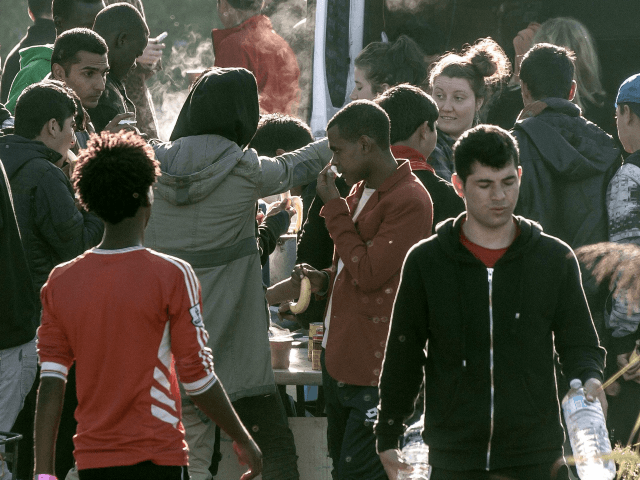The Mayor of Calais has banned food distribution to migrants in the city in a bid to prevent yet another ‘Jungle’ migrant camp from springing up.
Visiting Calais on Wednesday, the French Interior Minister, Bruno Le Roux, said no new shelters would be set up in the vicinity to avoid drawing migrants back to the port city.
But he made it clear that the distribution of food would not be prohibited by the state – an assertion Mayor Natascha Bouchard moved quickly to counter, arguing that food distribution also acted as a draw.
On Thursday, officials placed posters around the site of the old Jungle shanty town issuing a mayoral decree banning the “regular, persistent and large presence of individuals distributing meals to migrants” to maintain peace and security in the area.
It also prevents “repeated, prolonged gatherings” of people, effectively preventing charities from setting up food distribution points which draw crowds.
The decree was rapidly enforced; one volunteer has told The Guardian that police fired teargas at charity workers and migrants during a breakfast distribution on Thursday morning.
“They wanted to stop the distribution, and they wanted to stop people from sleeping in the area,” said Sarah Arrom, who volunteers with Utopia56. “There has never been teargas before when we’ve been trying to hand out food.”
Migrants have been flocking to the northern town for nearly two decades in a bid to gain passage to the UK via the Channel Tunnel and ferry crossings to Dover. In 1999, the French Red Cross opened a migrant reception centre at Sangatte, but it quickly became overcrowded prompting migrants to set up various Jungle camps in the surrounding woods, relocating when the police moved them on.
Sangatte was closed in 2002 by the then President Nicolas Sarkozy on request by the British Labour government, having housed some 67,000 migrants during its three years – but the migrants remained.
The first official Jungle made headlines in 2008 when a British journalism student was subject to a “particularly brutal” gang rape by migrants while attempting to write a story on those drawn to the region. The following year saw two operations to bulldoze the tents and structures erected by the 800 or so migrants living there, but again the migrants drifted back, numbers rising steadily.
It was the 2015 migrant crisis which supercharged the Jungle, sending migrant numbers spiralling as high as 10,000, while the camp took on the characteristics of a shanty town complete with bars, shops, restaurants, churches, and a school.
January 2016 saw the partial demolishment of the town, the wooden structures replaced with shipping containers offering dry, warm beds and electricity for 1,500 migrants. By October, the remainder of the camp had been demolished and thousands of migrants bussed out to migrant reception centres across France.
Within weeks, the migrants began to return.
Despite the police running a “zero tolerance operation”, rounding up migrants for relocation to regional reception centres, Utopia56 says it now distributes 250 meals a night. Refugee Community Kitchen and Help Refugees make a further 400 meals a day, according to Renke Meuwese, who works with both charities.
But Bouchart is determined to prevent a return to the Jungle’s heydey. “We have already suffered too much,” she said.

COMMENTS
Please let us know if you're having issues with commenting.